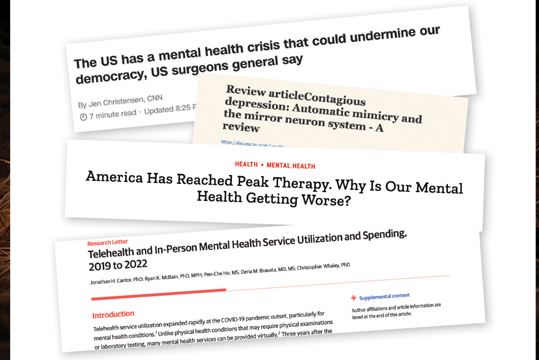 By Renée Hopkins, Qualitative Research Manager, Decision Analyst, Arlington, Texas, rhopkin@decisionanalyst.com
By Renée Hopkins, Qualitative Research Manager, Decision Analyst, Arlington, Texas, rhopkin@decisionanalyst.com
The U.S. was experiencing a nationwide mental health problem even before COVID-19, and in the last several years, that problem has become a crisis. You don’t have to look far to find alarming headlines such as “The U.S. has a mental health crisis that could undermine our democracy.”1
This story from September 2023 quotes U.S. Surgeon General Dr. Vivek Murthy: the “inadequate mental health care system” in the U.S. is failing to meet current mental health needs.
What makes this crisis so serious is what is being done to address this problem isn’t working. Americans are utilizing mental health services more than they ever have.2 From 2019 to 2022, the use of mental health services jumped by almost 40 percent among millions of U.S. adults with commercial insurance, according to a recent study in JAMA Health Forum.3
These numbers were among many statistics quoted in an August 2023 Time magazine article, “America Has Reached Peak Therapy. Why Is Our Mental Health Getting Worse?” The article traces the problem back to a root cause—America’s mental health safety net relies on therapies and medications that may not work very well and, at best, “only skim the surface of a vast ocean of need.” As a result, “even as more people flock to therapy, U.S. mental health is getting worse by multiple metrics.”
The decline in mental health extends to marketing researchers, according to the most recent Insights Association annual report on mental health in the marketing research industry, “Mental Well-Being in Insights: Small Steps Toward Better Health.”4
Key takeaways from the Insights Association research:
- One-third of insights professionals say their job is “highly stressful,” while almost all the respondents reported “feeling stressed.”
- Three-fourths feel anxious, and three-fourths feel fatigued.
- More than half feel exhausted and burned out.
More than 50 percent of respondents said their biggest stressor is unhealthy workloads driven by deadlines and client demands. The numbers seem to indicate that insights professionals feel their workplaces only value mental health in the abstract—more than 50 percent cited “unsupportive management” as a major cause of their stress and said coworker/manager demands are “way up” since 2022.
Qualitative Researchers Are Exposed to an Extra Dose of Stress
In addition to stress from clients and workplaces, qualitative researchers can struggle with “referred stress” from their study participants. The overall decline in mental health makes qualitative research more difficult and amplifies the personal challenges for moderators. Given the state of mental health in the U.S., moderators for many sensitive subjects should always be prepared to handle participants who appear stressed and/or depressed.
While any topic can trigger stress in participants, the researchers most likely to directly encounter this are those doing healthcare research. My colleague Pamela Waite is a Harvard-trained psychologist who has been a qualitative researcher for 30 years. She says there’s “no doubt about it—my respondents are more depressed… more negative in their worldview. When I interview physicians, I see them being more frustrated, too, with systems and policies.”
At the root of the problem is the fact that depression can be contagious.5 Qualitative researchers are at risk of “catching” depression while interviewing participants who are under significant stress.
“Connecting with research participants and stakeholders, hearing their stories, and identifying with what they feel allows us to uncover powerful human truths…. But immersing yourself in other people’s emotions—especially around sensitive topics like physical and mental health—can take a toll. Over time, it’s easy for researcher burnout to creep in,” wrote consultant and professional development coach Paula Rosecky in a recent post on QRCA’s Qual Power blog.6
Rosecky recommended that researchers allow themselves time to mentally and emotionally prepare for interviews. Researchers must set boundaries to avoid picking up too much stress from their interviewees. She suggested that visualization and grounding techniques can help with this.
Setting strong boundaries can help a moderator prepare to put participants at ease, which one must do to get participants to share their stories. Pamela Waite describes how she approaches interviews with people stressed by a serious illness. “Sometimes, I give hints… for people who are struggling with illness, I can say things like, ‘What did your specialists say?’ They may reply, ‘Oh, I haven’t seen the specialist yet.’ I might say, ‘Oh, interesting! Has there been a discussion about that?’ This way, I can help in my own tiny, little way without influencing the participant. It gives a bit of hope and lightens the mood of the conversation by inferring that not all strategies have been taken yet.”
To avoid “catching” depression from participants, Waite says, “I know I can’t change things [for the participant]. Typically, I hope that I’ve got some time in between their interviews because I need to stretch and pet my cats. I just have to walk away. I have to think about other things.”
When a Participant’s Mental Health Issues Derail the Interview
Moderators have a responsibility to avoid causing mental distress in their participants or making the participants’ stress worse. But that can happen, and if it does, moderators should act to protect their participants.
“Those conducting qualitative research should always be prepared for the possibility that a respondent could become distressed, and of our obligation to secure their well-being,” wrote Colleen Welsh-Allen in a 2021 Qual Power blog post.7 She referenced ESOMAR guidelines: “We have an ethical responsibility to protect our respondents, and our lines of questioning should never cause mental distress.”
However, “we never know if one of our respondents… just had a difficult break-up, death of a loved one or animal, a difficult situation at work or home, etc.,” she wrote. “The important thing is to have a plan ready because you never know when a situation might happen…. You may not be sure what to do to help or whether your intervention might make the situation worse. But taking action is always the best choice.”
Welsh-Allen recommended that researchers have ready relevant suicide help hotlines—and reference them when applicable. “We need to be attentive to the participant, ensuring the interview is stopped if the participant is getting stressed/uncomfortable.”
Several years ago, a discussion on the QRCA online community forum touched on the subject.8 One commenter shared: “We have the phone number of a local therapist and the suicide prevention phone numbers on hand. We continue the conversation until we have a professional on the line who takes the conversation over.”
She also recounted a situation where a participant in a bulletin board project posted that “it would be easier to just end it all.” She posted a link to a suicide prevention group in a comment directly to that participant.
Pamela Waite encountered a similar issue while interviewing HIV-AIDS patients during the initial years of that crisis. She called those interviews the most difficult she has ever done. “One young man in front of me started tearing up. He said, ‘I’m sorry… my best friend just died last night, and… you know, it’s just not worth it, and maybe I shouldn’t even keep fighting.’ So, I did the suicide check. ‘Do you have a plan? Have you expressed this to anyone?’”
Given the current state of mental health in America, we should all be prepared for such situations, even if we are not doing healthcare research.
Dealing with Client-Related Stress
Boundary-setting can also help researchers deal with clients who request extremely tight deadlines that lead to unhealthy workloads, which were cited as leading causes of researcher stress in the Insights Association research.
Waite said she’s able to shake off the impact of a heart-wrenching interview better than she can shake off difficult client interactions. She went on, “Some [clients] think that you can get through 42 questions in an hour, and you can’t. Some don’t understand that true moderation sometimes means you follow the train of thought of the person in front of you rather than rigidly following the discussion guide.”
Regarding timelines, she said, “I need to sit with the data. I need to walk around with it. I need to mow my lawn with it. I need to take a walk with it because that’s how things start bubbling and how I get the overall feel, the zeitgeist of the project. It isn’t okay to say, I’ve done 10 interviews now, and I’m going to write it. No. I don’t have the feeling for it yet.”
Even worse is when the qualitative research “turns up problems that are bigger and more impactful to the client’s business than the one they are studying,” which makes the analysis more complicated.
However, she said, “The clients are going to be there. They’re not going away. So, I have to figure out a better way of working with them.”
The Insights Association research found that managers and senior leadership can be instrumental in improving employee mental health and well-being, especially when it comes to issues related to overwork and impossible timelines.
“The thing that probably reduces my stress the most is my manager, who will intervene… who will extend timelines and talk with folks. He takes the stress off of me,” said Waite. “He says, ‘You’re doing a good job. Keep doing it. You know you’re valuable; we’re glad you’re here.’ That just deflates my stress level.”
Ways to Address Qualitative Researcher Stress, Burnout, and Depression
Fortunately for those of us who attended the November 17 virtual town hall in which the Insights Association’s gloomy research results were presented, a lot of time was given to how researcher stress and burnout can be eased or even eliminated.
During the town hall, Harley McKee and Mark Petrone of Opinium, which conducted the Insights Association research, shared solutions that came directly from the one in five insights professionals who do say they feel supported in dealing with workplace stress.
What Managers and Senior Leadership Can Do
McKee and Petrone said people pay more attention to managers than managers realize. What managers do trickles down much more than formal policies or even what they communicate.
Their overall recommendation is that managers “walk the talk of mental well-being” by “creating a warm, nonjudgmental, welcoming culture.” Managers can show they have their teams’ back by stepping up for them in situations when a deadline perhaps can’t be met or a project shouldn’t be taken on.
Specifically, management and senior executives of research companies can:
- Help employees push back on unrealistic expectations—from clients and colleagues. Actively assess and adjust employee workloads to prevent burnout rather than wait for employees to reach a breaking point.
- Make mental wellness and well-being programs accessible when they are needed—when people are not at their best.
- Encourage employees to take PTO and recovery days instead of discouraging people from taking them.
- Model behaviors that ease stress to help normalize these behaviors within company culture: take mental health days themselves, share their own experiences with burnout, or participate in wellness activities.
- Create wellness programs that address well-being comprehensively, including mental, physical, and financial well-being.
- Prioritize work-life balance by establishing and respecting boundaries, such as not expecting employees to answer emails after hours or during weekends.
- Initiate honest conversations about mental health, perhaps at regular one-on-one check-ins with employees to discuss not just work performance but also well-being.
- Provide training for all levels of management on how to support their team’s well-being and how to recognize signs of strain in employees.
- Communicate specific steps the company is taking to support well-being.
- Tell employees, “You’re a wonderful person and need to be told so once in a while.”
Others who participated in the town hall had suggestions for managers and senior leadership.
Margot Benish, senior director, People + Culture, C+R Research:
- Make sure benefits programs are being used and change them if they are not.
- Set expectations with employees of what resources are available and be honest about the things your company may not have the resources to address.
- Give support to employees who use benefit programs.
- Do a little reflection on your own boundary setting and clean that up.
- Don’t hide your mental health needs from your team.
Dr. Ayalla Ruvio, academic director, Master of Science in marketing research and associate professor at Michigan State University:
- Understand that people bring their whole selves to work, which means that sometimes employees bring in outside stress.
- Managers tend to place stress on their best employees because they’re so good. Avoid this because, over time, stress can build up and lead to burnout.
Dr. Adeola Mead, executive well-being coach specializing in burnout prevention and recovery:
- Set boundaries—avoid taking on the extra responsibility for employees’ concerns. Don’t feel like you have to fix employees at that moment. Just make sure they know you heard them. That can go a long way toward fostering connection, which will ease stress.
What Qualitative Researchers Can Do to Improve Their Own Mental Health
The good news is that you don’t have to rely on interventions from your manager and improvements in workplace culture and benefits to improve your well-being. There’s a lot you can do on your own. Besides setting boundaries, you can also come to a better understanding of the social aspects of stress and depression and the relationship between physical health and mental health.
There’s an epidemic of loneliness or lack of belonging, according to Debby Schlesinger-Hellman, leadership coach, consultant, and cofounder of the Art & Science of Joy. She also participated in the town hall. “You have to have connections in order to have well-being. Since we work most of our waking hours, it’s imperative that leaders and employees figure out how to create a sense of belonging, a feeling of community.” This is especially true for remote workers, who have to put in extra effort to have these connections.
“A feeling of belonging can become a groundwork for a feeling of well-being. If you have someone to talk to about stress or anxiety over things that happen at work, that’s a great starting point,” she said.
Dr. Ayalla Ruvio concurred. “Socially-related sources of stress are much more impactful than almost any other type of stress,” she said. “If I give you a hard task to do, it may not feel as stressful as if I force you to work with people you do not like. Similarly, social isolation is a stressor because it takes away a possible solution—you cannot use a social mechanism to help you overcome the stress or ‘share the stress’ with others.”
Improving your mental health and well-being at work “starts with asking yourself, ‘what do I need?’ Then you have to say that to someone who has the agency to do something about it for you,” said Margot Benish.
“You must also understand that it is in your control to make sure you have what you need and work with others at their workplace to find solutions that work,” said Schlesinger-Hellman.
“There is no separation between mental and physical health,” said Dr. Adeola Mead. “Stress leads to chronic illnesses and physical symptoms. Those symptoms give people a legitimate cause for taking time off, which turns into a cycle of feeling ill on all levels.”
Her recommendation: Figure out what you need. Monitor your own health. “Sometimes we forget that we don’t just send messages from our brains to our bodies. We send messages from our bodies to our brains, too. When you’re breathing shallowly, you’re telling your body, ‘We’re under stress; act accordingly, up-regulate.’
“But if you take the time to breathe slowly and deeply, you tell your brain, ‘We are safe.’ The ways that you move your body and put your body in a safe space will also impact your mind. Any time you can put yourself in a state where you’re not trying to address a threat will help.”
References
- Christensen, Jen. The U.S. has a mental health crisis that could undermine our democracy, U.S. Surgeons General say. CNN Health, Sept. 28, 2023. (https://www.cnn.com/2023/09/28/health/mental-health-crisis-undermine-our-democracy-us-surgeon-generals-say/index.html)
- Ducharme, Jamie. America Has Reached Peak Therapy. Why Is Our Mental Health Getting Worse? TIME, Aug. 28, 2023 (https://time.com/6308096/therapy-mental-health-worse-us/)
- Cantor, Jonathan H., McBain, Ryan K., Ho, Pen-Che. Telehealth and In-Person Mental Health Service Utilization and Spending, 2019 to 2022. JAMA Health Forum, Aug. 25, 2023 (https://jamanetwork.com/journals/jama-health-forum/fullarticle/2808748)
- Opinium Research. Mental Well-being in Insights: Small Steps Toward Better Health (2023). Insights Association, Nov. 2023 (available from the Insights Association at https://www.insightsassociation.org/Education/Conference-Webinar-Recordings/Product-Info/productcd/MentalWellBeing2023)
- Paz, Lisiê Valéria, Viola, Thiago Wendt, Milanesi, Bruna Bueno, Sulzbach Juliana Henz, Mestriner, Régis Gemerasca. Andrea Wieck, Léder Leal Xavier, “Contagious Depression: Automatic Mimicry and the Mirror Neuron System—A Review,” Neuroscience & Biobehavioral Reviews, Volume 134, 2022, https://doi.org/10.1016/j.neubiorev.2021.12.032. (https://www.sciencedirect.com/science/article/pii/S0149763421005807)
- Rosecky, Paula. Empathy & Armor: Connect while Protecting Your Wellbeing. QRCA Qual Power blog, Oct. 3, 2023. (https://www.qrca.org/blogpost/1488356/494212/Empathy–Armor-Connect-while-Protecting-Your-Wellbeing)
- Welsh-Allen, Colleen. Dealing with Mental Health Conditions. QRCA Qual Power blog, Nov. 16, 2021. (https://www.qrca.org/blogpost/1488356/383633/Dealing-with-Mental-Health-Conditions)
- Forum Discussion. Research Issues, Questions and Solutions—guidelines for helping a respondent who appears to become unstable. QRCA Community Forums, July 2019. (https://www.qrca.org/forums_engagement/Posts.aspx?group=&topic=1496106&page=1)





Be the first to comment